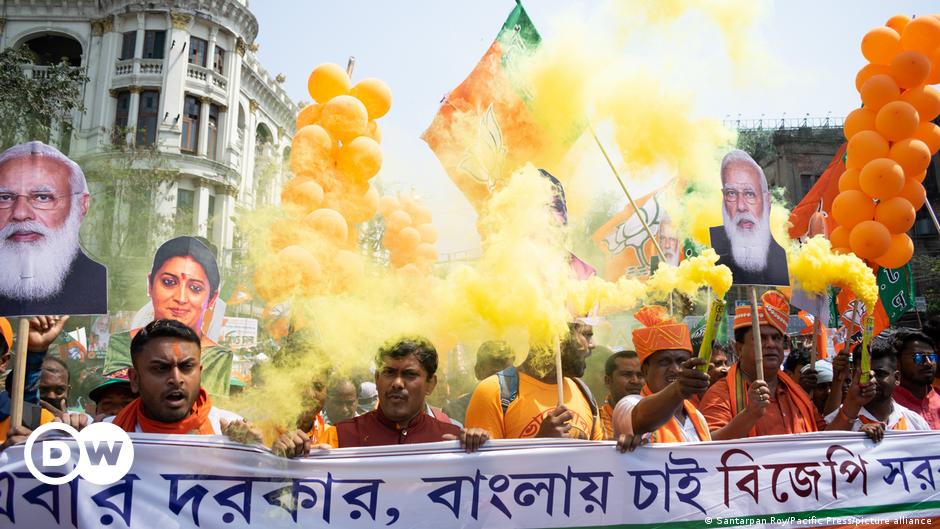
Election season is underway in five Indian states, and the big question is whether Prime Minister Narendra Modi’s Bharatiya Janta Party’s (BJP’s) core Hindu nationalist agenda will continue to be well-received by the over 180 million eligible voters.
The defining credo of the BJP since 1989 has been “Hindutva,” a political ideology that promotes the “values” of the Hindu religion as being the cornerstone of Indian society and culture.
The BJP’s continuous reliance on an aggressive Hindutva plank has given it electoral success in the past. However, the BJP’s political opponents say the party’s ultra-nationalist rhetoric, based on Hindu nationalism, threatens to displace secularism as the foundation of India’s constitution.
The politicization of the Hindu religion has also been combined by the BJP in recent years with more aggressive policies that India’s Muslim community says treats them as second-class citizens.
Yogi Adityanath, a Hindu monk and chief minister of Uttar Pradesh, India’s most populous state, has emerged as a poster child for the Hindu right-wing.
He recently described the election in the northern Indian state as an “80% versus 20%” contest, which roughly corresponds to Uttar Pradesh’s Hindu and Muslim population proportion.
Hindu-Muslim tension in India
Since the BJP was again elected into power in 2019, tensions between Hindus and Muslims have escalated.
Watch video 02:34 Uttar Pradesh candidate pushes anti-Muslim message
A citizenship law passed in 2019 called the Citizenship Amendment Act (CAA) fast-tracks citizenship of Hindu, Sikh, Buddhist, Jain, Parsi and Christian immigrants from Afghanistan, Pakistan and Bangladesh who arrived in India before 2015. However, critics say it excludes fast-tracking citizenship rights for Muslims.
In 2020, Muslim-majority neighborhoods in Delhi were the scene of violent riots that were set off by protests against the CAA. Mobs of mainly Hindu men targeted Muslim homes and businesses.
Two days of bloody violence left 53 dead, including both Hindus and Muslims, and more than 200 wounded.
More recently, a controversy over women wearing the Islamic headscarf “hijab” in schools and colleges has sparked tension and protest in southern India between Hindus and Muslims.
“The proliferation of anti-Muslim hate forms the architecture of Hindutva,” rights activist Shabnam Hashmi told DW.
“Hate speech against Muslims in India has gained momentum, with several right-wing and Hindutva leaders calling for a Muslim ‘genocide’ with no response from the government,” she said.
How intertwined are Hindutva and Hinduism?
Hindutva was first proposed as a political idea in 1928 in a pamphlet written by Vinayak Damodar Savarkar titled “Hindutva: Who is a Hindu?”
“Hinduism has many texts including the Vedas, the Puranas while Hindutva has one central political pamphlet,” Congress lawmaker Shashi Tharoor wrote in a recent social media post.
The BJP says Hindutva is a vehicle for social development and governance.
UP Chief Minister Adityanath said at a recent BJP rally that “Hindutva and development are complementary to each other. Those who are opposing Hindutva are in fact opposing development and Indianness.”
Watch video 02:51 Controversy over hijab at India’s educational institutions
Hindutva is ‘not divisive’
However, Tom Vadakkan, a Christian member of the BJP from the southern Kerala state, said that there is room from pluralism in Hindutva, despite it being rooted in Hinduism as a religion.
“There should be no hair-splitting about Hinduism and Hindutva. They are conjoined, and a historical reality which is civilizational. We live in a pluralistic society and there is no attempt to impose the party’s ideology on any denomination,” he told DW.
“Hindutva does not mean divisive politics,” he added.
Muslim BJP member Mukhtar Abbas Naqvi, a minister of minority rights in Modi’s government, presented a different point of view, contending that Hindutva is not associated with religion but is rather a guiding civilizational principle.
“It is because of Hindutva that we talk about unity in diversity,” said Naqvi during a heated television debate over Hindutva in December 2021.
Shazia Ilmi, a BJP spokesperson, told DW that Hindutva was being misinterpreted by the media and denied that the BJP discriminates against Muslims, adding that social development under the political ideology provides benefits for all of India’s ethnic groups.
A major new Pew Research Center survey of religion across India, based on nearly 30,000 face-to-face interviews of adults conducted in 17 languages between late 2019 and early 2020, found that Indians of all religious backgrounds overwhelmingly say they are very free to practice their faiths.
K J Alphons, a BJP lawmaker and a former minister, told DW that sectarian strife in India should not be blamed on Hindutva politics.
“We are a huge country with nearly 1.4 billion people. Many of these incidents involving Muslims or Christians are economic in nature and not religious. These are isolated incidents and to see a conspiracy in such isolated incidents is unfair,” he said.
Watch video 26:00 Jay Panda on ‘Conflict Zone’
Edited by: Wesley Rahn







